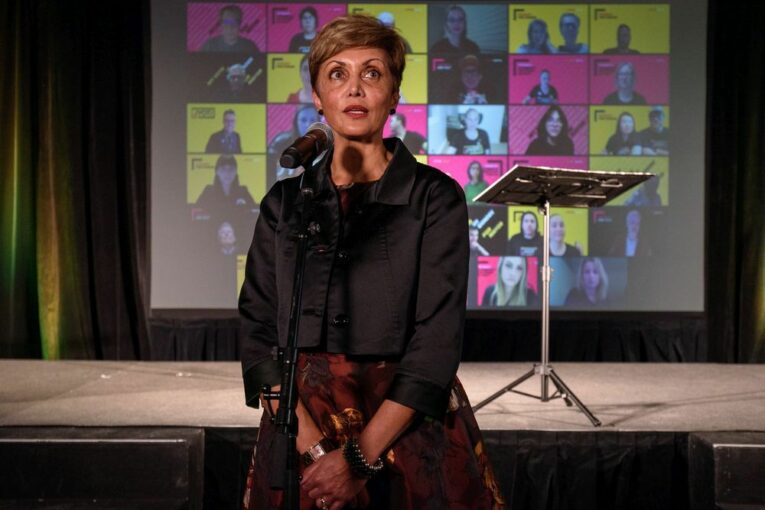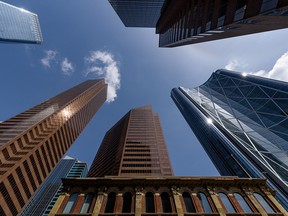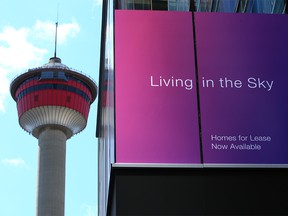
Ask Jyoti Gondek what’s the most important economic issue facing Calgary today and the city’s next mayor doesn’t miss a beat.
“From a very practical perspective, if we don’t start filling up those vacancies and raising the assessed value of our downtown properties, we’re going to continue to be in a problem with our revenue stream,” Gondek said in an interview Tuesday, less than 24 hours after winning Calgary’s mayoral election .
“We need to find ways to make sure we are repurposing those vacant spaces for either new businesses or new ventures or residential.”
The mayor-elect and her new council colleagues , who will be sworn into office next Monday, inherit a formidable number of financial and economic issues to tackle in their four-year term, including the plight of the downtown.
For example, how will the economy and local businesses come out of the pandemic, and what will the COVID-19 crisis do to the long-term future of people working inside downtown office towers?
Can Calgary stem the emptying out of these office buildings south of the Bow River — the vacancy rate sat just under 30 per cent during the third quarter — and rejuvenate the area?
And how can the tech sector’s local expansion be nurtured, pulling more investment, companies and skilled workers into Calgary’s orbit?
When it comes to the downtown, the incoming mayor said council needs to work with the arts community and creative industries, as well as the real-estate sector, to “activate those spaces.” It means ensuring the area is bustling with activity throughout the day and evening, not just during office hours.
“We fell into the trap with creating office buildings that were only buzzing from 9 to 5, so we have to be quite intentional in what we are doing in those spaces to ensure people want to be downtown,” said Gondek, who has a PhD in urban sociology.
“The first thing we need to recognize is this is not something that is going to be fixed overnight, or not even something we will fix in this term. It is probably a 10-year play. So let’s get the foundational work done and let’s get it right.”
It’s a big task.

During the July-to-September period, the downtown office vacancy rate hit 29.9 per cent, up slightly from the previous quarter, according to data from Avison Young.
The city now has almost 14 million square feet of vacant downtown office space and 44 of 171 buildings are more than half empty, said Susan Thompson, a research manager at Avison Young in Calgary.
Despite these challenges, Gondek and her council counterparts are holding several important cards.
Unemployment is falling. The Calgary region saw a record 815,000 people employed last month.
A recent Conference Board of Canada report says an upturn in the energy sector will fuel 7.6 per cent economic growth in Calgary this year, reversing a 7.4 per cent contraction last year.
In 2022, Calgary’s gross domestic product (GDP) is projected to expand by more than six per cent.
A brisk housing market and construction activity, strong retail sales, and a rebound in the accommodation and food services sectors are all helping. A report Tuesday by the Calgary Real Estate Board said home sales in the summer were the highest third-quarter figures since 2014.
And oil and natural gas prices continue to climb.
“Our more traditional businesses are in better shape than they were just a year ago,” said Charles St-Arnaud, chief economist with Alberta Central.
“She arrives (as mayor) at a moment when Calgary is on more of an upturn.”
The city’s economic future will also depend on Calgary’s success in attracting new businesses and investment, creating jobs and training skilled workers.
Gondek supports the Greater Downtown Plan, a $200-million strategy adopted by council last spring to promote revitalization of the core. It includes providing $45 million in incentives to encourage commercial office owners to adapt their buildings to other uses.

She has also called for the current distribution of taxes — with homeowners now paying 52 per cent of all municipal property taxes and businesses shouldering the remainder — to be adjusted to keep Calgary competitive with other cities.
The city will work with the Calgary Chamber of Commerce and economic development authority to “understand what is happening in the region and how we make ourselves competitive again,” Gondek added.
Chamber CEO Deborah Yedlin said several key decisions about the downtown will confront the next mayor and council, including how to get more empty buildings repurposed and how to work with post-secondary schools to bring more students downtown.
“This is the way we rebalance our tax base and attract and retain talent, and attract new businesses and help diversify our economy,” said Yedlin.
“This will be the most visible measuring stick.”
Leading a new council with nine new faces will put the onus on the next mayor to build a consensus on issues dealing with spending, economic development and the downtown, said pollster Marc Henry of ThinkHQ Public Affairs.
“If she has a PhD in city hall, they are just learning how to read,” said Henry, who served as chief of staff to former mayor David Bronconnier.
“How do you bring those people along . . . and (ensure) everybody is pulling in the right direction? It’s a tough job.”
No one said it would be easy. But for Calgary’s 37 th mayor, the difficult task at hand starts with the downtown.
Chris Varcoe is a Calgary Herald columnist.
You can read more of the news on source
